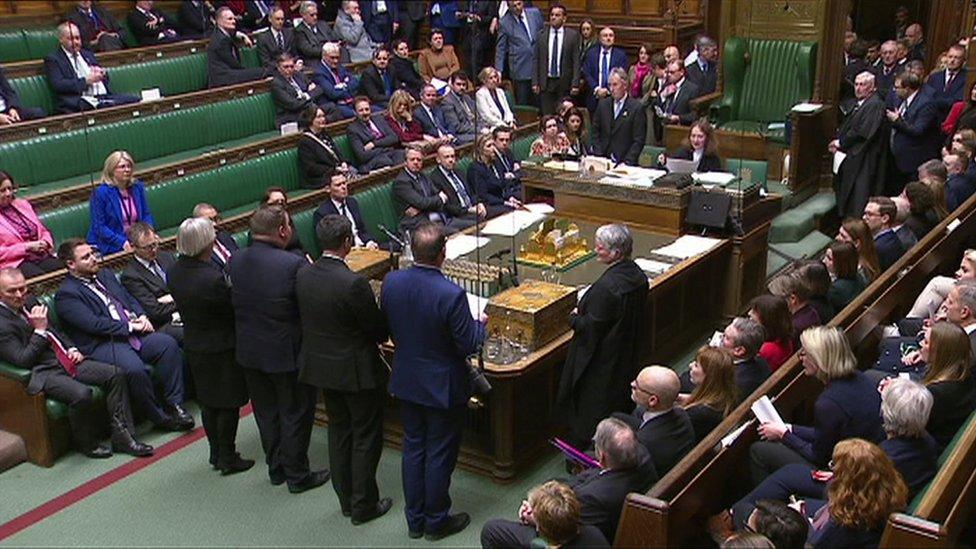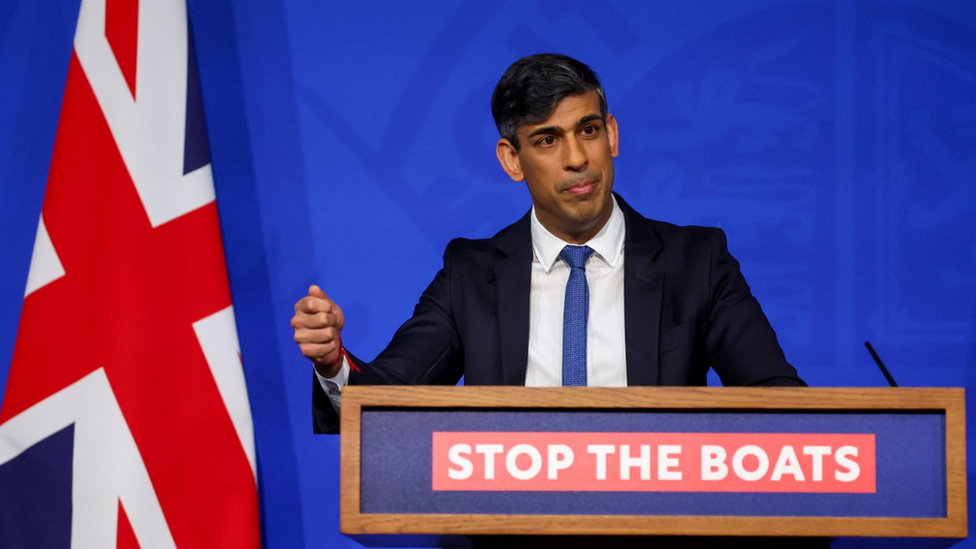Rishi Sunak sees off Conservative rebels as MPs back Rwanda bill
- Published
- comments
Rishi Sunak’s Rwanda plan battle isn’t over yet
Rishi Sunak has succeeded in getting his key Rwanda bill through the House of Commons after a Tory rebellion failed to materialise.
The bill, which aims to stop legal challenges against ministers' plans to send asylum seekers to Rwanda, was approved by 320 votes to 276 votes.
Dozens of Tories thought the bill was flawed and had threatened to rebel but in the end, only 11 voted against it.
The bill now goes to the House of Lords where it will face stiff opposition.
Mr Sunak argues that deporting some asylum seekers to Rwanda will be a deterrent to migrants seeking to get to the UK by crossing the Channel in small boats, but Labour has labelled the plan an expensive "gimmick".
The government is hoping to get the flights to Rwanda running by the spring.
The prime minister is due to hold a Downing Street press conference on the policy at 10:15 GMT.
Over the past two days MPs on the right of the Conservative Party have tried to change the bill, arguing that, without amendments, the government's Rwanda plan could be blocked by the courts.
On Wednesday, former immigration minister Robert Jenrick tabled an amendment which would permit the UK government to ignore parts of human rights law in relation to sending people to Rwanda.
Mr Jenrick also proposed an amendment which would ensure ministers automatically reject last-minute interim orders from the European Court of Human Rights.
Such an order was responsible for blocking a flight to Rwanda back in June 2022.
The amendment was not approved by MPs but received the backing of 61 Conservatives - the biggest rebellion of Mr Sunak's premiership.
Some MPs had suggested they would be willing to abstain or even vote against the entire bill if it remained unchanged.
The bill could have fallen if about 30 Conservatives had voted against it - an outcome that would have severely damaged the prime minister's authority, potentially fatally.
However, in the event, just 11 MPs - including Mr Jenrick and former Home Secretary Suella Braverman - voted against it.
Other Tory MPs on the list include Miriam Cates, Sir Simon Clarke, Mark Francois and Danny Kruger.
Eighteen Conservative MPs did not record a vote, however some of those may have simply been unable to attend the vote rather than deliberately abstaining.
Conservative Danny Kruger, who voted against the bill, said some of his colleagues had opted to support the legislation despite their concerns in order to avoid "political disruption".
Sir Simon Clarke, who also opposed the bill said: "All Conservatives want the Rwanda policy to succeed... the profound misgivings some of us hold about the bill are on record, but history will now relate who was right."
Labour opposed the bill, with shadow home secretary Yvette Cooper labelling the policy a "costly con" that had so far failed to send any asylum seekers to Rwanda.
Home Secretary James Cleverly defended the plan arguing that it sent "an unambiguously clear message that if you enter the United Kingdom illegally you cannot stay".
"This bill has been meticulously drafted to end the merry-go-round of legal challenges," he added.
The debate over the legislation has exposed on-going divisions among Conservatives - on Tuesday evening two deputy chairmen, Lee Anderson and Brendan Clarke-Smith, quit their roles in order to vote for the rebel amendments.
Despite his concerns, Mr Clarke-Smith back the bill at the final stage, while Mr Anderson did not register a vote.
One rebel source told the BBC: "It is not the case that tonight's vote is the end of matters.
"If the House of Lords chooses - as I suspect they will - to send back amendments that weaken the bill, the response of those [right-wing Conservative MPs] will be to table amendments in lieu that toughen the bill."

The Rwanda bill passed the through the House of Commons by 320 votes for to 276 votes against
The bill is now expected to face further opposition in the House of Lords, where many peers are concerned about whether it complies with international law.
Crossbench peer Lord Carlile, a leading lawyer and former independent reviewer of terrorism legislation, said that while peers would not "thwart the government", the Lords had a responsibility to "protect the public from abuses of legal correctness and principle by the government".
"We've seen in various other countries the damage that can be done when governments use perceived and often ill-judged political imperatives to place themselves above the courts," he told BBC Radio 4's Today programme.
"This is a step towards totalitarianism and an attitude that the United Kingdom usually deprecates."
As his press conference, Mr Sunak is likely to urge peers to pass the bill quickly to finally allow the policy to get off the ground.
But even once the bill becomes law, Tory rebels say it will not work as they believe planes will be grounded once again by legal challenges.
Home Office minister Chris Philp told BBC Breakfast the government was aiming for flights to take off this spring.
He played down divisions in the party and insisted "there was near unanimity on the Conservative side that this bill as a whole made sense and represents a very significant step forward".
On Wednesday Rwanda's President Paul Kagame said he would return money to the UK if no asylum seekers were sent to his country.
The UK has so far paid £240m to the east African nation and is expected to pay a further £50m.
A Rwandan government spokeswoman later said the country had "no obligation" to return the money but would consider a request for a refund from the UK.
In Westminster, a Downing Street spokesman was forced to deny it was trying to change the Civil Service code to include a presumption that emergency injunctions from the European Court of Human Rights should be ignored.
At the start of the day Home Office Minister Michael Tomlinson had said the government was "looking at that", but hours later No 10 said it was not seeking to rewrite the code.
The Cabinet Office later issued guidance stating that it was the "responsibility" of civil servants to "implement" a minister's decision to ignore rulings from the court.
- Published13 June 2024

- Published17 January 2024
